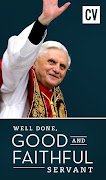Pope Benedict concludes historic visit to Turkey amid praise and challenges
Fri Dec 1, 5:12 PM
By Brian Murphy
ISTANBUL, Turkey (AP) - Pope Benedict was greeted in Turkey with a lecture on how the Christian West scorns Islam. He left Friday with Istanbul's chief Islamic cleric speaking lyrically of better days ahead between the faiths.
Few predicted how boldly, and with such apparent success, the pontiff would seek to remake his battered image in the Muslim world during four days of speeches, sermons and symbolic gestures that included an instantly famous moment of silent prayer in a mosque while facing Mecca.
"Istanbul is a bridge that unites sides," the Pope said before ending his first papal trip to the Muslim world. "I hope that this dialogue continues."
Turkey's influential Milliyet newspaper bid the Pope farewell with an optimistic headline: "The Istanbul Peace."
But it will require attention to sustain.
The Pope left without laying out clear ideas on how to follow through with his promises for greater understanding and dialogue with Muslims. He also put some sensitive demands on the table: wider protections and rights for Christian minorities in the Muslim world, including Turkey's tiny communities whose roots go back to the apostles.
Originally, the trip was envisioned as a pilgrimage to reinforce Christian bonds and reach out to Turkey's remaining Christians, including Catholics estimated to number between 20,000 and 30,000. But after the Pope gave a speech in September that angered many Muslims, it became a test of the Vatican's ability to mend ties with the Islamic world.
Muslims erupted in protest in response to the speech, in which Benedict quoted a Byzantine emperor who characterized some of the teachings of the Prophet Muhammad as "evil and inhuman," particularly "his command to spread by the sword the faith."
The Pope later offered his regrets that his speech caused offence and stressed that the quotes did not reflect his personal opinion.
In Turkey, he carefully avoided anything that could be perceived as a slight against Islam. He said all religious leaders must "utterly refuse" to support violence. Even when a statement from "al-Qaida in Iraq" denounced the trip, the Vatican responded with a general rebuke of "violence in the name of God."
The Pope's dramatic moment of silent prayer in Istanbul's famed Blue Mosque on Thursday capped a wide-ranging effort to win back Muslim sentiments, which included expressing support for Turkey's steps to become the first Muslim country in the European Union.
The gestures were well-received among Turkish religious leaders and in the media.
Mustafa Cagrici, the head mufti in Istanbul, waxed poetic about "a spring ahead for this world" after praying alongside Benedict at the Blue Mosque. He said the Pope "stood in prayer just like Muslims."
It marked only the second papal visit in history to a Muslim place of worship. John Paul II made a brief stop in a mosque in Syria in 2001.
Scenes from the Pope's minute of prayer - eyes closed, hands clasped - appeared on the front page of nearly every newspaper in Turkey. "History written in Istanbul," wrote the Vatan newspaper.
The Pope's visit also made the front pages of several Arab newspapers. The pan-Arab Asharq al-Awsat ran a front-page picture of the pope praying in the Blue Mosque, with the headline, "The Pope turns toward Mecca in prayer."
"He came here with humility, and for the pontiff that takes an act of courage," said the Rev. Alexander Karloutsos, a Greek Orthodox clergyman who set up meetings between the Pope and the spiritual leader of the world's Orthodox Christians, Ecumenical Patriarch Bartholomew.
A member of the papal entourage put the visit in even more epic terms. Roger Cardinal Etchagaray compared the mosque visit to John Paul II's dramatic stop in 2000 at Israel's Western Wall, where he left a copy of his declaration asking God's forgiveness for sins against the Jews.
"Benedict did for the Muslims what John Paul did for the Jews," the cardinal told reporters.
Some in the Arab world, however, remained skeptical about whether the Pope's visit would completely repair the damage caused by his speech in September.
"It relieves to some extent what he said before, but we're hoping to see more from him. For example, will he continue this tone when he returns to the Vatican?" said Fahmi Huweidi, an Egyptian commentator on Islamic affairs who has written columns in the Arab newspaper Al-Hayat sharply criticizing the Pope's speech.
There were tense moments early on in the trip. Ali Bardakoglu, the top Muslim cleric in Turkey, sat across from Benedict on Tuesday and complained that claims about Islam's violent nature were feeding "a growing Islamophobia" in the West.
Days later, however, Bardakoglu called the visit "a very positive step."
Turkish authorities had mobilized their biggest security force in decades in preparation for the visit. Istanbul's police chief, Celalettin Cerrah, said more than 9,500 officers were on duty during the week. Helicopters buzzed over rooftops and minarets, while sharpshooters watched over every stretch of the papal route.
However, only several limited demonstrations were held during Benedict's visit.
Before he left Friday, Benedict sought to reaffirm his message of reconciliation during a mass for members of Turkey's Roman Catholic community.
"You know well that the church wishes to impose nothing on anyone, and that she merely asks to live in freedom," he said. In the courtyard of the 160-year-old Holy Spirit Cathedral, the Pope then released several white doves into the sky.
Copyright © 2006 Canadian Press
Copyright © 2006 Yahoo! Canada Co. All Rights Reserved.






